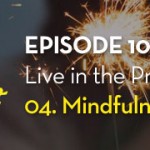Be Mindful
Step 4
In the podcast this week we have been looking at Mindfulness. In the previous steps we have focussed on letting go of the past. Mindfulness requires that we are living in the present having let go of the past and not worrying about the future. Focusing on the past leads to depression and focusing on the future leads to anxiety.
Twenty years ago Mindfulness was an odd word used by strange silent Buddhists sitting beneath Banyan trees conducting obscure meditative practices. These days mindfulness has become a part of every day psychotherapy. To be Mindful means to be aware of your self in the present. Also to be aware of the world around you, of who you are, what you are doing and the effect that it will have on other people.
To live effectively we need to be mindful and awake so that we can enjoy our existence while at the same time causing the least damage to others. Blow there are eight reasons why it might be useful to be mindful and live in the present.
1: Get Physical…
Living mindfully means enjoying your body. We each have a body. In the East the body is seen as the temple of the soul, as something that should be looked after and respected, treasured and loved. To live mindfully in your body means to treat it with respect. Keep it well serviced and exercised. Not too fat and not too thin. To eat and drink sensibly. The man who ran the London marathon aged 101 said that his health and fitness was all down to his diet…interesting.
Q: What does your body need you to do for it today?
2: Get Social…
Living mindfully means making positive social connections. We are social animals. Our evolution has happened mainly due to our ability to cooperate with each other from the invention of tools to the development of social change. To live in social mindfulness is about caring for other people. This may be charitable or simply helping someone across the road. One of the good things about us all looking after other people is that everyone’s needs are met, including yours.
Q: Who could you help today?
3: Get some fun
Living mindfully means having fun. If you are living a balanced life then you will already be having fun. If, on the other hand your are trying to create a work life balance the chances are that life is not fun for you right now. When did you last have some fun? Living mindfully and having fun go together. If you are bored or stuck in a routine that is mind numbing you are not living mindfully. When you are living mindfully you are self-aware and aware of your needs and doing things that make you feel good. For most of us the fun is in being challenged, trying something new, taking a holiday, starting a new venture. I often say to clients “when did you last have fun?” Sadly they often look blank and cannot remember.
Q: What would be fun to do today? Or what fun things can you plan for the future?
4: Get some love
Living mindfully means both loving and being loved. We all need a bit of love in our lives. Love, self esteem and a robust immune system and health all run together. It is also true that love and happiness go together. Yet, as in all things, it begins at home. To be loved you have to begin with loving yourself. This is the mirror task. Go to a mirror look yourself in the eyes and say, “I love you”. At the point when you can say it, feel it and, believe it you are ready to be loved by another person. Living mindfully with love ensures that you make decisions that serve you well. It also means that you only do things that serve other people well. Positive loving action and the process of Dharma are the same thing. ‘Do as you would be done by’ is the guiding principle.
Q: Who do you love? Q: Would it be a good idea to tell them? Q: What do you need to do to feel loved?
5: Get wealthy
Living mindfully means an abundance of wealth. Wealth is a funny concept because we tend to attach it to money. Yet, we can be wealthy in many things. Wealthy with friends, opportunities, love, happiness and so on. But, we all need to live and to do that we need money and resources according to our needs. How much is enough? Some people may say ‘a million’. I guess it sounds like a nice round sum. For any of us if we have more than we need we are in a state of wealth and abundance. If you need £99 but you have £100 you are wealthy beyond need, you are in surplus. Being mindfully wealthy requires that we know what we need and that we have a surplus, we are rich.
Q: Are you wealthy? If not, what would you need to feel wealthy?
6: Get organised
Living mindfully means living with clarity and not with clutter. It is often said that you can tell what is going in someone’s head by looking at their desk. I guess you could extend that to looking at their house or, the way that they live. Just like a tree bears fruit, our actions in life bear results and these we see all around us. There comes a point in everyday, week, month, year or life time when we need to put our house in order and sort things out. These may be physical, social, emotional and so on. My teacher once told me “you are never ready to live until you are ready to die”. He was saying that when your life is clear and in order, when you have said everything that needs to be said, done everything that needs to be done, taken care of all debts and promises, now, you are ready to get on with life. To live mindfully means that you clear up all your mess as you go along so that you live in a world of clarity.
Q: What do you need to do to clear up your messes and create clarity in your life?
7: Get intuitive
Living mindfully with intuition means living with insight. Those that cultivate their intuition develop clear vision, they become clairvoyant. Insight is a magical quality that is only really developed in a few people. We all have the ability to connect with others. We may be thinking of someone and the phone goes and there they are. We spontaneously meet the right person follow the right hunch. Often intuitive insight is called coincidence or accident. Mindful insight comes to those that develop it. This means creating mind time. It may come in the form of meditation or contemplation exercises. It might be in swimming up and down the pool, walking to dog or going for a run. However it is done, regular consistent and persistent mind time allows us to get into the zone. In the knowing silence of the zone we begin to here the answer to our problems.
Q: Where will you find your mind time today?
8: Get creative
Living mindfully always leads to creativity. In many ways this is the goal that we are all aiming for. True creativity is the science of the imagination. This is the ability to solve problems. When we are truly mindfully awake there are no problems, there are no obstacles. All there ever is are learning experiences, challenges and, ultimately solutions. To be mindfully creative you need to attend to the previous seven steps, pull your life into shape. It is then in the waking that the ability to solve problems flows from deep within. Answers flow like spring water. In this new found ability to find solutions there are no problems, no stress, no anxiety. All is safe and as if should be.
Q: What problems do you have that can be turned into challenges? Now go and solve them!
Ashtanga
The word Ashtanga means to be integrated or to be whole. Mindful people follow the way of Ashtanga and attend to all levels:
Health and physical development
Friends and relationships
Fun and experience
Love and loving
Wealth and money
Clarity and organisation
Intuitive understanding
Creative problem solving
Be whole and be happy
Live in the present
Take care
Sean x




Trackbacks & Pingbacks
[…] Here’s a link to this week’s blog post by Sean […]
Leave a Reply
Want to join the discussion?Feel free to contribute!